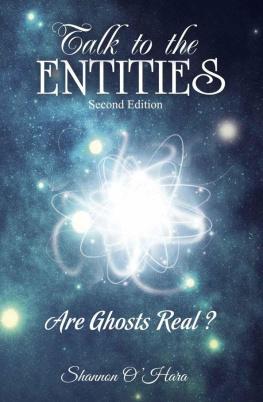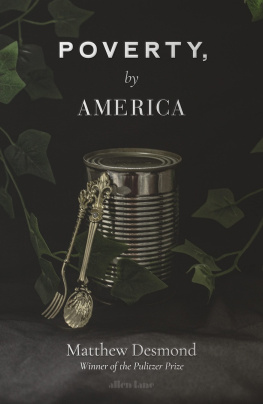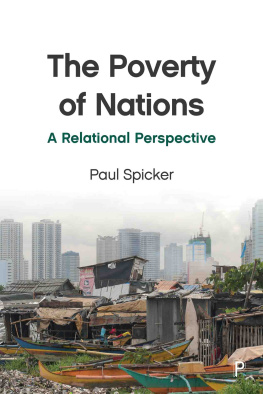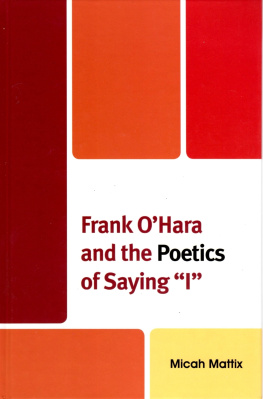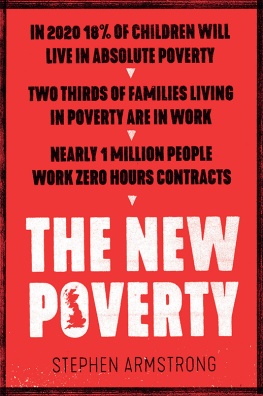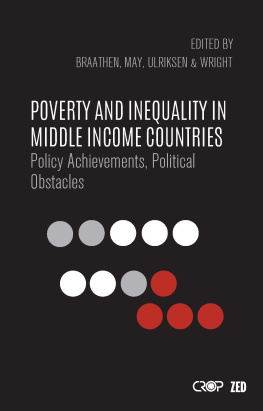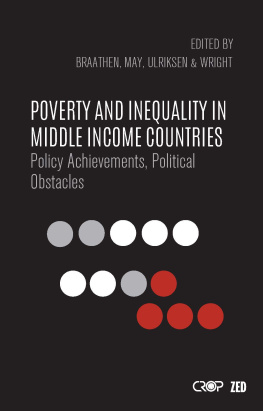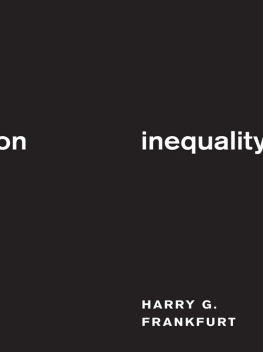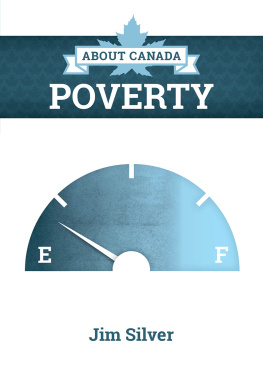At a time when people who experience poverty are stigmatised in the arts and media on a daily basis, Mary OHaras illuminating book presents a powerful condemnation of the shaming narratives that target the most vulnerable in our society.
Paul Sng, filmmaker
Rich people should be required to read this book and poor people should be allowed to. I have rarely seen a more broad and beautiful picture of people who have done more with less than this book. OHara has woven a rich tapestry of joy and terror and talent and lost opportunities and the picture she draws is the most comprehensive description of poverty Ive seen yet.
Linda Tirado, journalist and author of Hand to Mouth
In a time of extreme social and economic division, Mary OHara lifts the lid on who truly benefits from keeping us divided and how we can flip the script of poverty to make a fairer society for all. A powerful and important book.
Mahsuda Snaith, author of How to Find Home
Following up on Austerity Bites, Mary OHara shows us why poverty sucks. Not just for the obvious reasons of struggle and deprivation, but because poverty is produced by a specific style of politics that revels in the shame of others, a politics where the US and the UK are past masters.
Mark Blyth, Brown University and author of Austerity: The History of a Dangerous Idea
For anyone who has ever known what it feels like to be poor.
This book is dedicated to the memory of my dear friend, Jennifer Kearney, her son Arthur, and to the memory of Harry Leslie Smith, an extraordinary advocate for social justice and equality.
This book is for the incredible young women who are my goddaughters: Carrie Birch, Lucy Morson and Katie Tarrant.
Overcoming poverty is not a gesture of charity. It is the protection of a fundamental human right, the right to dignity and a decent life.
Nelson Mandela
Shame (Verb): A Definition (MacMillan Dictionary)
to make someone feel guilty or embarrassed;
to cause yourself or someone else to lose respect or a good reputation.
Stigma (Noun): A Definition (Merriam Webster Dictionary): a mark of shame or discredit
Bullying (Noun): A Definition (Merriam Webster Dictionary): abuse and mistreatment of someone vulnerable by someone stronger, more powerful, etc.
Narratives are often described as a collection or system of related stories that are articulated and refined over time to represent a central idea or belief.
The Narrative Initiative, Toward New Gravity
First published in Great Britain in 2020 by
Policy Press University of Bristol 1-9 Old Park Hill Bristol BS2 8BB UK t: +44 (0)117 954 5940 www.policypress.co.uk | North America office: Policy Press c/o The University of Chicago Press 1427 East 60th Street Chicago, IL 60637, USA t: +1 773 702 7700 f: +1 773 702 9756 www.press.uchicago.edu |
Policy Press 2020
British Library Cataloguing in Publication Data
A catalogue record for this book is available from the British Library.
Library of Congress Cataloging-in-Publication Data
A catalog record for this book has been requested.
ISBN 978-1-4473-4926-6 paperback
ISBN 978-1-4473-4928-0 ePub
ISBN 978-1-4473-4927-3 ePdf
The right of Mary OHara to be identified as the author of this work has been asserted by her in accordance with the Copyright, Designs and Patents Act 1988. All rights reserved: no part of this publication may be reproduced, stored in a retrieval system, or transmitted in any form or by any means, electronic, mechanical, photocopying, recording, or otherwise, without the prior permission of Policy Press.
The statements and opinions contained within this publication are solely those of the author and not of the University of Bristol or Policy Press. The University of Bristol and Policy Press disclaim responsibility for any injury to persons or property resulting from any material published in this publication.
A book is always a collaboration but for one like this, which is part of a much larger multi-platform initiative, and where so many people contributed their time, support, expertise, insights and advice, it is especially true. To every single person who helped me with Project Twist-It and this book, in any way, I couldnt have done it without you and I thank you from the bottom of my heart.
I owe a debt of gratitude to the people who worked directly on the production of this book and who were instrumental in making Project Twist-It a reality: to Ali Shaw and her team at Policy Press; and Abigail Scott Paul and the team at JRF for having faith in and championing this work, including Paul Brook who very kindly gave us permission to use his illustrations. My thanks also to copywriter and all-round production whizz Alexis Harvey, Think Nation founder Lizzie Hodgson, Linsay Rousseau, Chris Kaboli, Sam Kieffer, Dann Galucci, Sandra Barron, Jessica Rae Huber, Jessica Samson and Billie J.D. Porter, who in so many wonderful ways brought Project Twist-It to life.
To everyone to who worked with PTI and Think Nation on making films or who was involved in our live event in Canterbury, England, including the team at the Gulbenkian Theatre, Louisa Roach, Dr Heejung Chung, Educational Life CIC, Sarah Jones, Chris Duncan, Possibility People, Art31, Wigan Youth Zone and Imago.
Sincere thanks also to June Cigar, Kerry Hudson, Natasha Carthew, Sarah Smarsh, Linda Tirado, Vince Wallace Junior, Dominic Gwinn, Kayleigh Garthwaite, Mahsuda Snaith, Kat Woods, Shaun Glanville, Jonathan Wakeham, Conrad Murray, Cash Carraway, Paul Sng, Pete McKee, Chuck Collins, Mark Brown, Holly Walsh and Janet Owen-Driggs, and Mary Bisbee-Beek, my US publicist. To Jameela Jamil, Wale Shittu, Anna Miles, Nadine Shah, Aoife Lennon, Tim Whittaker and the kids and volunteers at Mighty Writers, JJ Tatten and Mez Green from The Warren in Hull and all the amazing youngsters who agreed to be interviewed including Jodie Langford and Andrew Gooch, who took part in PTI Live, and all the incredible young people from Battersea Arts Centres Beatbox Academy who brought so much creativity and energy to the project and to PTI Live.
My gratitude also to Rebecca Vallas, Alice Wong and her colleagues working on #CripTheVote for organising a powerful and impactful livestream on disability and poverty on Twitter, Frances Ryan, Kwame Boateng, Sarah Anderson, Christine Riccione, George W. Hopkins, Kieton Saunders-Browne, Olivia Chumacero, Sylvia Hernandez, Antonio Rodriguez, Hayk Makhmuryan, Peter Stefanovic, the Poor Peoples Campaign team including Reverend Dr William Barber, Reverend Dr Liz Theoharis, and grassroots volunteers including Joyce Brody, Lenny Brody and Sheilah Garland. To Shane Pangburn, Howard Read, Tim Molina, Karen Dolan, Diana Skelton and the team at ATD Fourth World including the people with lived experience who added their voices, Andrea Levere, Kat Calvin, Poverty2Solutions, Ruth Patrick and the Dole Animators, Thrive Teesside, Bev Skeggs, Imogen Tyler, Stephen Hinshaw, Gray Brechin, Simon Duffy, Maria Mansfield, Maurice Lim-Miller, Trevor Davis, Eric Trules, Jude Habib of Sound Delivery and those working on Being the Story, Leeds Poverty Truth Commission, Jacqui Roberts and the team at Shoreditch Trust, Kate Walz, Michael Sheen, Sean McAllister, Brian Pelan, Una Murphy, Jo Unwin, Zita Holbourne, Beth Johnson, Gee Sinah, Nat Kendal Taylor, Skylinn Landry, Carol Bostridge, Garry Greenland, Dr Adi Jaffe, Rachel Broady, all the women I met in South Carolina who talked to me about the links between domestic violence and poverty, the US army veterans who shared their experiences, and Dr Jonathan Tomlinson and the patients in his surgery in London, who told me their stories. Thanks also to Bird La Bird, Mairi Ryan at the RSA, Paul Scates, Ian Jones, and to the people who put time in to sharing the mission and content of PTI across social media.



